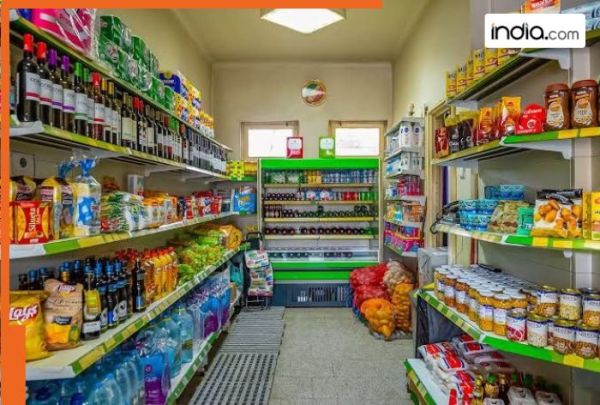Higher costs, reduced quantity: FMCG companies shift strategy amid inflation as demand for smaller…
GH News January 07, 2025 07:07 PM

Have you noticed that a Rs. 10 biscuit packet is now smaller than it was a year ago even though the price hasn’t changed? Many companies have adopted this strategy to cope with inflation by reducing the size of their products while keeping the prices unchanged. Simultaneously several brands are also launching smaller low-priced packs in the market. These companies are focusing on maintaining Rs. 5 Rs. 10 and Rs. 20 price points by reducing product weight.
With rising prices for groceries and household items more Indian consumers are choosing smaller packs to stay within budget. Products like soap snacks and tea have been hit hardest by inflation. Analysts from Nuvama Institutional Equities note that palm oil prices have increased by about 30% in the past year. As a result shoppers are buying smaller packs which is affecting overall sales.
Companies that have increased prices
FMCG companies struggling with inflation have raised prices in the December quarter. Companies like Hindustan Unilever (HUL) and Godrej Consumer Products Limited (GCPL) have increased soap prices by around 10 per cent. Similarly Bikaji has raised snack prices and Tata Consumer Products has hiked the cost of its tea range.
Analysts predict further price hikes by some companies this quarter. In a recent interview with The Times of India Maricos MD and CEO Saugata Gupta mentioned that they are in the process of increasing product prices.
Weak demand in urban markets
FMCG companies have experienced slower growth due to weak urban demand while rural markets are showing improvement aided by a good monsoon. However this recovery is gradual and cannot fully offset the urban slowdown. High commodity inflation leaves companies with little scope to reduce prices to boost consumption.
An analyst noted that if consumers start buying 500-gram tea packs instead of 1-kilogram packs or single soaps instead of multi-packs it will undoubtedly impact quarterly volume growth for companies.
 Have you noticed that a Rs. 10 biscuit packet is now smaller than it was a year ago even though the price hasn’t changed? Many companies have adopted this strategy to cope with inflation by reducing the size of their products while keeping the prices unchanged. Simultaneously several brands are also launching smaller low-priced packs in the market. These companies are focusing on maintaining Rs. 5 Rs. 10 and Rs. 20 price points by reducing product weight.
With rising prices for groceries and household items more Indian consumers are choosing smaller packs to stay within budget. Products like soap snacks and tea have been hit hardest by inflation. Analysts from Nuvama Institutional Equities note that palm oil prices have increased by about 30% in the past year. As a result shoppers are buying smaller packs which is affecting overall sales.
Companies that have increased prices
FMCG companies struggling with inflation have raised prices in the December quarter. Companies like Hindustan Unilever (HUL) and Godrej Consumer Products Limited (GCPL) have increased soap prices by around 10 per cent. Similarly Bikaji has raised snack prices and Tata Consumer Products has hiked the cost of its tea range.
Analysts predict further price hikes by some companies this quarter. In a recent interview with The Times of India Maricos MD and CEO Saugata Gupta mentioned that they are in the process of increasing product prices.
Weak demand in urban markets
FMCG companies have experienced slower growth due to weak urban demand while rural markets are showing improvement aided by a good monsoon. However this recovery is gradual and cannot fully offset the urban slowdown. High commodity inflation leaves companies with little scope to reduce prices to boost consumption.
An analyst noted that if consumers start buying 500-gram tea packs instead of 1-kilogram packs or single soaps instead of multi-packs it will undoubtedly impact quarterly volume growth for companies.
Have you noticed that a Rs. 10 biscuit packet is now smaller than it was a year ago even though the price hasn’t changed? Many companies have adopted this strategy to cope with inflation by reducing the size of their products while keeping the prices unchanged. Simultaneously several brands are also launching smaller low-priced packs in the market. These companies are focusing on maintaining Rs. 5 Rs. 10 and Rs. 20 price points by reducing product weight.
With rising prices for groceries and household items more Indian consumers are choosing smaller packs to stay within budget. Products like soap snacks and tea have been hit hardest by inflation. Analysts from Nuvama Institutional Equities note that palm oil prices have increased by about 30% in the past year. As a result shoppers are buying smaller packs which is affecting overall sales.
Companies that have increased prices
FMCG companies struggling with inflation have raised prices in the December quarter. Companies like Hindustan Unilever (HUL) and Godrej Consumer Products Limited (GCPL) have increased soap prices by around 10 per cent. Similarly Bikaji has raised snack prices and Tata Consumer Products has hiked the cost of its tea range.
Analysts predict further price hikes by some companies this quarter. In a recent interview with The Times of India Maricos MD and CEO Saugata Gupta mentioned that they are in the process of increasing product prices.
Weak demand in urban markets
FMCG companies have experienced slower growth due to weak urban demand while rural markets are showing improvement aided by a good monsoon. However this recovery is gradual and cannot fully offset the urban slowdown. High commodity inflation leaves companies with little scope to reduce prices to boost consumption.
An analyst noted that if consumers start buying 500-gram tea packs instead of 1-kilogram packs or single soaps instead of multi-packs it will undoubtedly impact quarterly volume growth for companies.